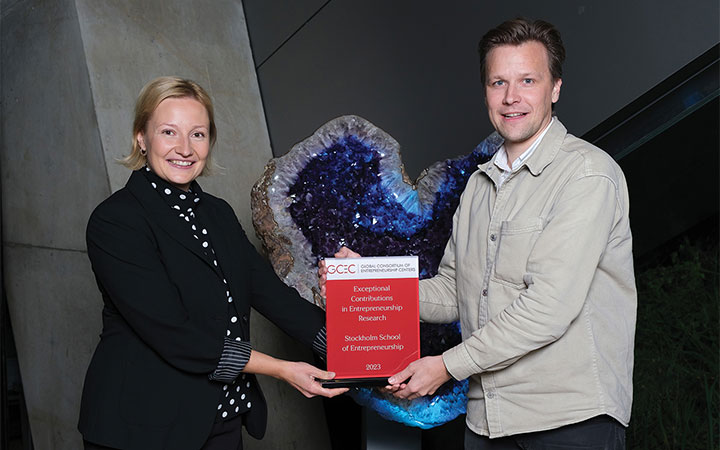GCEC Annual Global Conference Shares Profitable Messages to Improve Entrepreneurship Education
GCEC Annual Global Conference Shares Profitable Messages to Improve Entrepreneurship Education
By Eric Butterman
Leading member universities of the Global Consortium of Entrepreneurship Centers (GCEC) gathered Oct. 5-7 at The University of Texas at Dallas for the 27th annual GCEC Dallas 2023 conference; they met to network and share thought leadership and best practices for shaping the future of entrepreneurship education.
The three-day event encompassed about 180 sessions, panel discussions and workshops, held in locations throughout the UT Dallas campus. More than 200 speakers addressed more than 600 attendees from 250 member institutions. Almost 20 countries were represented, including Canada, England, Australia, India, Egypt, Singapore, Thailand, and Uruguay. Representatives from 28 Texas universities attended. Topics ranged from using artificial intelligence in the classroom to diversity, equity, and inclusion to engaging with the broader community beyond academia.
“We are honored to unite the thriving institutions and forward-thinkers that exemplify Dallas as an ideal launchpad for new endeavors, and to impart our commitment to adopting the entrepreneurial mindset to our worldwide network of colleagues,” said Carol Marcus-Rehtmeyer, executive director of the Institute for Innovation and Entrepreneurship.
The first keynote speaker of the conference was Jason McCann, CEO and co-founder of Vari, which has sold millions of stand-up desks that can be adjusted for sitting.
“Disruption” was a major focus of his speech.
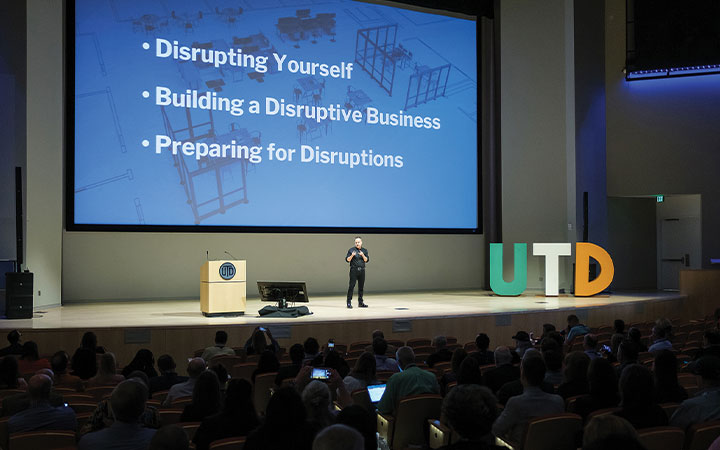
“I want you to think of it really in three different ways,” said McCann, who had previously made a foray into the holiday decorations business. “One is disrupting yourself. Two is thinking about building those disruptive businesses. And three, preparing yourself, your teams, your business for the disruptions that are going to hit you. So how we choose to respond to those challenges and disruptions is really, really key.”
He also discussed enthusiasm and pivoting, two qualities often vital to successful entrepreneurship.
Entrepreneurship is Your Oyster
The conference theme — Mindsets & Methods — was familiar to the conference hosts from the Institute for Innovation and Entrepreneurship, which was founded in 2006 at the Naveen Jindal School of Management to instill in its students the entrepreneurial mindset needed to launch new ventures.
Jackie Kimzey, associate professor of practice at the Jindal School, said that he felt the breadth of the sessions lifted the conference to different heights compared to many events.
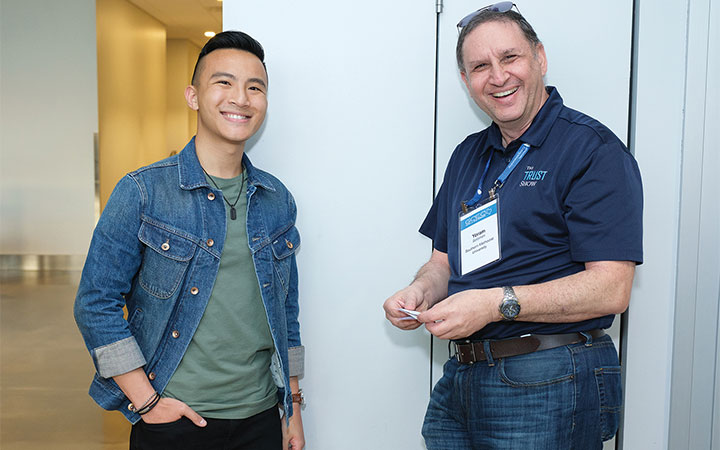
“I just feel that the conference has divided different areas well,” Kimzey said. “If you need technology knowledge, you could find that fit. If mindset is an issue, then there are opportunities there. It has that UT Dallas imprint of thinking through all the different issues people would be facing. We also have strong engagement from our faculty in sessions, showing what our school offers in talent and sharing, what has worked for us.”
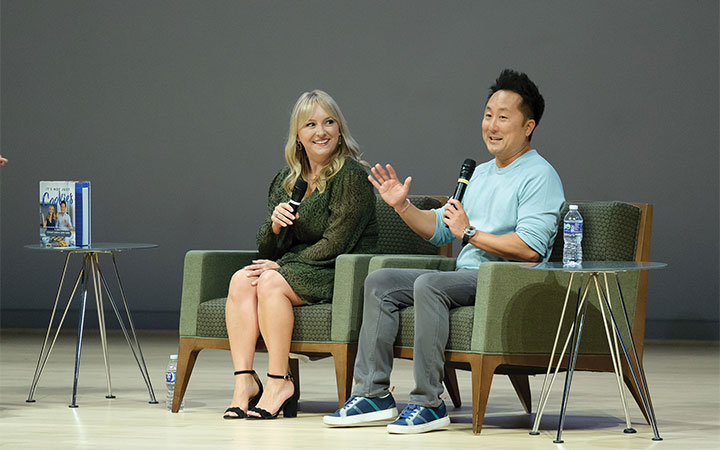
For the second keynote, attendees were in for a treat — in more ways than one. Tiffany and Leon Chen, founders of Tiff’s Treats, handed out cookies after their presentation. The couple shared the story of their auspicious first date. Having stood up Leon, Tiffany apologized with cookies. He, after tasting, had an idea. She didn’t want to turn cookies into a business. He did.
Hundreds of millions of cookies later, Tiff’s Treats had a $500 million valuation. That was one life-changing apology
A key tip from the couple is that business will have its share of losing.
We celebrate the success, but you won’t ever get to the success if you don’t fail. And, so, you have to be ready to accept failure, learn from failure, get past failure… – Leon Chen
Another keynote and fireside conversation featured a UT Dallas graduate. Born in Nigeria, John Olajide, BS’04, Founder and CEO of Axxess, noticed inefficiency in the home healthcare field, and today, Axxess is one of the global leaders in technology for this area.
Q&A interviewer Chris Bhatti, MA’06, UT Dallas assistant vice president for development and alumni relations, shared that a few years ago Olajide established the largest endowment for a scholarship in the computer science department’s history.
“All I’m trying to do is pay back the debt that I owe…” Olajide said. “I’ve been given so much by the school.” Formerly the chairperson of the Dallas Chamber of Commerce, Olajide offered his message of the importance of culture for a business and the value of family for a life.
Many breakout sessions hit the spot for attendees. In “Strap Yourself In! Witness the Real-World Rollercoaster Ride of a Robotics Startup | Documentary Adapted to the Classroom,” Kimzey and documentary filmmaker James Fontaine showed clips from a 10-episode documentary; “Strap Yourself In” was created to dispel the mystery of entrepreneurship and offer insights into the ups and downs of a company trying to land a huge robotics deal in Japan. Kimzey also appeared in the film.
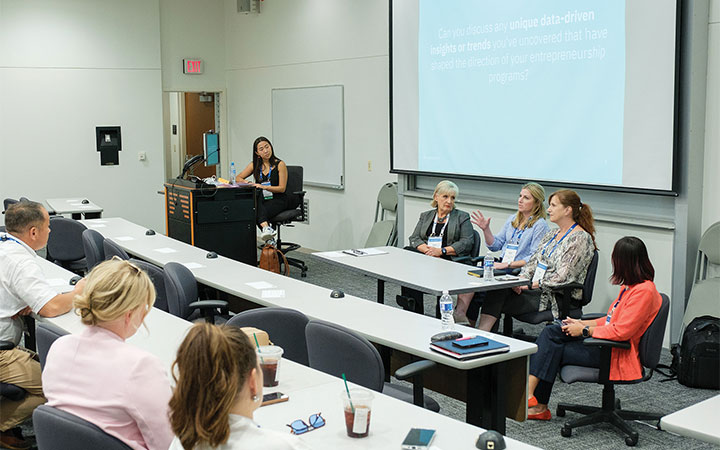
“We’re looking for feedback and partners to take this film as far as it can go.” From infighting to strategy, the clips hinted that Strap Yourself In! could both educate and entertain.
For the breakout session “Unlocking Engagement: The Power of Centralized Data,” Sarah Crowe, marketing and communications manager for the Institute for Innovation and Entrepreneurship at UT Dallas, explained how data from a subscription-based platform called StartupTree makes the difference in how her team targets engagement from different audiences across campus
“…It does help tremendously to figure out how we can shift our communications — the data we get lets us know if the imagery and even the language we use is working to reach those audiences and if not, we can shift, make some adjustments and retarget,” she said.
Steve Guengerich, associate vice president for innovation and commercialization at UT Dallas, was a part of the panel for the session titled “Startup Capital: It takes a village: Student Entrepreneurs, Angels, VCs and Universities.”
“From whether potential mattered more or experience mattered more to the importance of the overall feel for the team,” he said, “there were differing opinions, which showed there are many ways to define what could be successful entrepreneurship.
Another panelist in that session was Brian Hoang, BS’19, former founder and CEO of SURVIVR, a virtual reality technology for training law enforcement and the military. He’s now an instructor on the entrepreneurship faculty at UT Dallas, teaching a course called Startup Launch, which allows students to work on a venture while earning course credit.
“I remember being a student trying to start my own company and all the many challenges,” he said. “Being on the other side as an instructor and being on this panel, you see just how many different ways you can go about teaching students the philosophy to succeed in a business. But sometimes it may just start with building their confidence.”
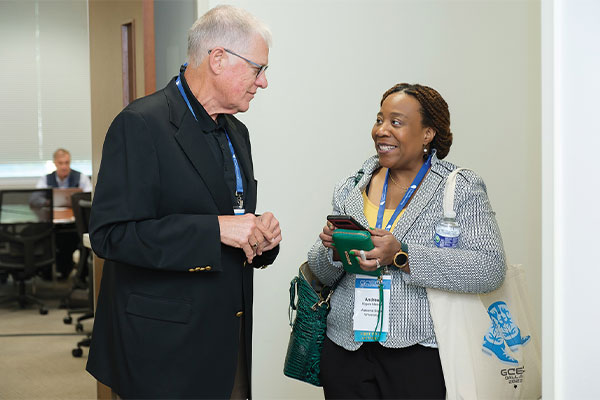
Honest and Aspirational
The overall response of attendees to the conference was extremely positive.
“This event has been a perfect chance to refresh in the middle of a semester,” said Mark Gagnon, Harbaugh Entrepreneur and Innovation Faculty Scholar at Penn State University. “You see people dealing with the same opportunities and challenges and get new insight. The keynote Jason McCann had a great story and it was enjoyable to hear him walk through his journey, where he didn’t skip over the tough parts. I’ve seen those successful like him gloss over them. I loved how he turned it back to us as the educators that we need to move forward and continue to disrupt ourselves to deal with disruptions.
“There was a strong breakout session over lunch on stakeholder engagement and managing a center. Many want to do better in their day job but are also teaching research and have administrative responsibilities. Engaging with peers in how to better go about this is helpful. I garnered many insights to take back to Penn State, including on how to successfully engage with stakeholders,” Gagnon said.
Kyle Luth, business counselor and data analyst with nonprofit S.G. Atkins Community Development Corporation, also found a lunch roundtable a standout.
“It was on the mindset of being an entrepreneur and how to apply it in educating students to have it,” he said. “Navigating how people have put mindset training to work and how it affects different levels of students at different ages, it was a big help.”
This event has been a perfect chance to refresh in the middle of a semester. You see people dealing with the same opportunities and challenges and get new insight. – Mark Gagnon, Harbaugh Entrepreneur and Innovation Faculty Scholar at Penn State University
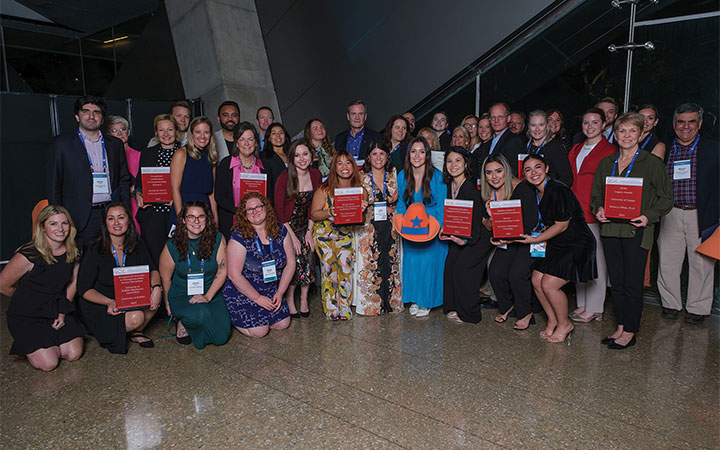
Krystal Geyer, associate director of the Center for Entrepreneurship at Ohio University, found a conference focus on trying to break down silos valuable.
“It’s something we’re all trying to do in cross-collaboration,” she said. “I’m looking for strategy and keeping the center relevant — I found that value here at the conference.”
Guengerich, a longtime leader for the university in entrepreneurial offerings, also found the GCEC conference a big winner for the school and attendees.
“This really has shown again what we can do with a large-scale event,” he said. “What I’m hearing across the board is about the quality of people and the sessions to learn from. It’s clearly making a difference. Many came together to pull this off and it shows our knowledge and enthusiasm for entrepreneurship and how we want to grow it here and help others grow it. This is a strong collaborative atmosphere.”
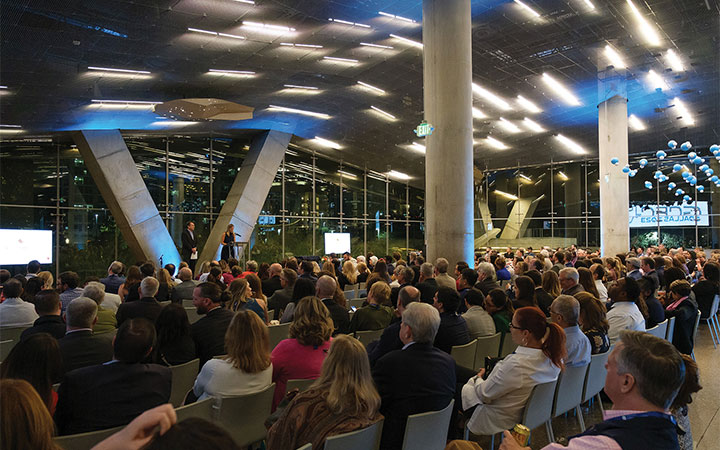
Notable sponsors included Kauffman Foundation, VentureWell, Tory Burch Foundation, Michelson Institute for Intellectual Property, McKinney Economic Development Corporation and the City of Richardson.
At the close of GCEC Dallas 2023, 12 universities were awarded top honors in nine categories and several others were commended. UT Dallas’ institute team won the GCEC Center for Entrepreneurial Leadership award.
“It was a privilege to be a part of the leadership team that pulled together such a dynamic gathering of innovators and leaders from all over,” said Dr. Emily Choi, an associate professor of instruction in the Organizations, Strategy and International Management Area and the academic director of the Jindal School’s innovation and entrepreneurship programs. “We continue to be inspired in our work to foster innovation and entrepreneurship at UT Dallas. Our true measure of success lies in the knowledge shared, connections made and inspirations ignited!”
